Institute for Digital Health & Innovation
June 25, 2020
Digital Health Visits Help Regional Campuses Meet COVID-19 Challenges
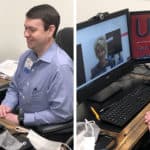
Brittnay Hall, 39, was at an impasse: COVID-19 worries were making worse her pre-existing problems with anxiety. Also, thinking of having an in-person visit with her physician about her anxiety medications made her feel unsafe. Digital health technology resolved her dilemma. Hall, of Newark, had a more-than-20-year patient-physician relationship with Julia Roulier, M.D., a family…
February 24, 2020
Blue & You Foundation Gives $147,000 to UAMS AR-IMPACT to Help Physicians Fight Opioid Use Statewide

A $147,000 grant from the Blue & You Foundation for a Healthier Arkansas will allow the University of Arkansas for Medical Sciences (UAMS) to expand a program to fight opioid addiction around the state through use of its digital health network. The announcement was made Feb. 20 at UAMS by the Blue & You Foundation,…
January 21, 2020
New UAMS HealthNow Offers 24/7 Digital Health, Live Video Access to Convenient Care
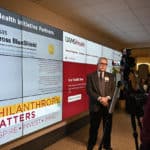
Starting today through UAMS HealthNow, the University of Arkansas for Medical Sciences (UAMS) has begun providing 24-hour, digital health access to convenient, real-time care for Arkansas patients using the internet through mobile devices or computers. Arkansas patients at any time can connect via live video and see UAMS expert health care providers who offer a…
December 11, 2019
UAMS Awarded $4 Million to Study Digital Delivery of Heart Patient Care

The University of Arkansas for Medical Sciences (UAMS) has been awarded $4 million by the Patient-Centered Outcomes Research Institute (PCORI) to study digital delivery of health care to patients with heart failure. The project is under the leadership of Leanne Lefler, Ph.D., APRN, an associate professor in the College of Nursing, who is a Fellow…
October 16, 2019
UAMS Institute for Digital Health & Innovation Awarded $4 Million Grant to Help Sexual Assault Victims
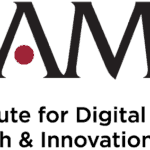
A new digital health program to provide the expertise of sexual assault nurse examiners to rural hospital emergency departments recently received funding through a $4 million, federal grant to the University of Arkansas for Medical Sciences (UAMS) Institute for Digital Health & Innovation. The U.S. Department of Justice’s Office for Victims of Crime awarded the…
October 9, 2019
Digital Health Stroke Program Reaches Patient Care Milestone

Applause greeted Renee Joiner when she announced a long sought after achievement for Arkansas’ digital health stroke network — getting more than 50% of stroke patients from hospital arrival to treatment in 60 minutes or less. Along with many other speakers, Joiner, director of the UAMS Institute for Digital Health & Innovation Stroke Program, addressed…
September 4, 2019
Awardees Honored for Contributions to Digital Health
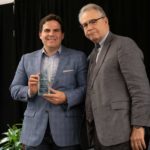
The UAMS-led South Central Telehealth Resource Center recently presented three awards to honor those for their work building networks for and advocacy of digital medicine. The awards were presented at the South Central Telehealth Forum, held Aug. 19 and 20 in Nashville, Tennessee. The resource center serves Arkansas, Mississippi and Tennessee. It functions primarily through…
August 9, 2019
UAMS Partners With Arkansas Blue Cross and Blue Shield to Expand Comprehensive Digital Health Network

A $1 million grant to the University of Arkansas for Medical Sciences (UAMS) from Arkansas Blue Cross and Blue Shield will enable the UAMS Institute for Digital Health & Innovation to advance digital health statewide to provide patients better and more streamlined access to health care. The grant was announced today as leaders from UAMS…
May 3, 2019
FCC Commissioner Impressed by UAMS Digital Health Initiatives
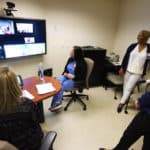
UAMS’ pioneering work in bringing health care to those who need it through digital health applications has drawn the attention of a top federal official who traveled from Washington D.C. to UAMS recently to see for herself. Jessica Rosenworcel, a commissioner on the Federal Communications Commission, visited April 29 with UAMS Chancellor Cam Patterson, M.D.,…
March 7, 2019
UAMS-Led Stroke Program Helps Lower Arkansas to Seventh in Stroke Deaths among All States

Arkansas recently fell from sixth to seventh place in the nation in the number of stroke deaths per capita, a huge improvement that health officials credit in part to a statewide telemedicine program of stroke education and treatment led by the University of Arkansas for Medical Sciences (UAMS). Only four years ago, Arkansas still was…
Previous page Next page